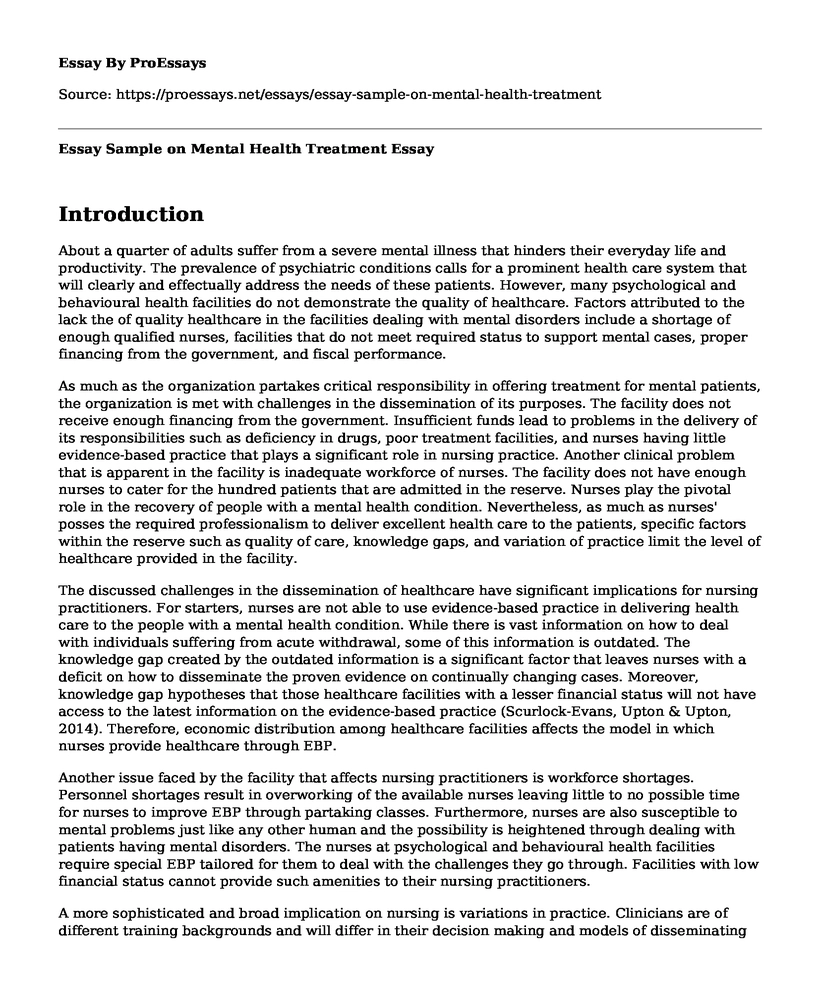Introduction
About a quarter of adults suffer from a severe mental illness that hinders their everyday life and productivity. The prevalence of psychiatric conditions calls for a prominent health care system that will clearly and effectually address the needs of these patients. However, many psychological and behavioural health facilities do not demonstrate the quality of healthcare. Factors attributed to the lack the of quality healthcare in the facilities dealing with mental disorders include a shortage of enough qualified nurses, facilities that do not meet required status to support mental cases, proper financing from the government, and fiscal performance.
As much as the organization partakes critical responsibility in offering treatment for mental patients, the organization is met with challenges in the dissemination of its purposes. The facility does not receive enough financing from the government. Insufficient funds lead to problems in the delivery of its responsibilities such as deficiency in drugs, poor treatment facilities, and nurses having little evidence-based practice that plays a significant role in nursing practice. Another clinical problem that is apparent in the facility is inadequate workforce of nurses. The facility does not have enough nurses to cater for the hundred patients that are admitted in the reserve. Nurses play the pivotal role in the recovery of people with a mental health condition. Nevertheless, as much as nurses' posses the required professionalism to deliver excellent health care to the patients, specific factors within the reserve such as quality of care, knowledge gaps, and variation of practice limit the level of healthcare provided in the facility.
The discussed challenges in the dissemination of healthcare have significant implications for nursing practitioners. For starters, nurses are not able to use evidence-based practice in delivering health care to the people with a mental health condition. While there is vast information on how to deal with individuals suffering from acute withdrawal, some of this information is outdated. The knowledge gap created by the outdated information is a significant factor that leaves nurses with a deficit on how to disseminate the proven evidence on continually changing cases. Moreover, knowledge gap hypotheses that those healthcare facilities with a lesser financial status will not have access to the latest information on the evidence-based practice (Scurlock-Evans, Upton & Upton, 2014). Therefore, economic distribution among healthcare facilities affects the model in which nurses provide healthcare through EBP.
Another issue faced by the facility that affects nursing practitioners is workforce shortages. Personnel shortages result in overworking of the available nurses leaving little to no possible time for nurses to improve EBP through partaking classes. Furthermore, nurses are also susceptible to mental problems just like any other human and the possibility is heightened through dealing with patients having mental disorders. The nurses at psychological and behavioural health facilities require special EBP tailored for them to deal with the challenges they go through. Facilities with low financial status cannot provide such amenities to their nursing practitioners.
A more sophisticated and broad implication on nursing is variations in practice. Clinicians are of different training backgrounds and will differ in their decision making and models of disseminating healthcare. As much as research-based evidence is readily available, providing healthcare in a mental facility solely depends on individual nurses. Therefore, decision making of nurses working in mental health care is a critical aspect of nursing. However, decision making is directly affected by the access to research-based information. As discussed, the ability of a facility to provide evidence-based practice depends on its financial status. Therefore, the decision that a nurse effects is significantly affected by the validity of information. More so, whether the existing medical information nurses use is outdated or present-day will substantially affect the outcome of their decision. Information available to nurses as provided by the facilities' ability to access credible information, is directly connected to the conclusions that nurses make (Friesen-Storms, Bours, van & Beurskens, 2015).
References
Friesen-Storms, J. H., Bours, G. J., van der Weijden, T., & Beurskens, A. J. (2015). Shared decision making in chronic care in the context of evidence based practice in nursing. International Journal of Nursing Studies, 52, 393-402. Retrieved from: https://www.researchgate.net/profile/Anna_Beurskens/publication/264245641_Shared_decision_making_in_chronic_care_in_the_context_of_evidence_based_practice_in_nursing/links/5a1d156ca6fdcc0af3269e13/Shared-decision-making-in-chronic-care-in-the-context-of-evidence-based-practice-in-nursing.pdf
Scurlock-Evans, L., Upton, P., & Upton, D. (2014). Evidence-based practice in physiotherapy: a systematic review of barriers, enablers and interventions. Physiotherapy, 100(3), 208-219. Retrieved from: https://www.researchgate.net/profile/Dominic_Upton/publication/260806861_Evidence-Based_Practice_in_Physiotherapy_a_systematic_review_of_barriers_enablers_and_interventions/links/5a17988e0f7e9be37f9590d4/Evidence-Based-Practice-in-Physiotherapy-a-systematic-review-of-barriers-enablers-and-interventions.pdf
Cite this page
Essay Sample on Mental Health Treatment. (2022, Jul 15). Retrieved from https://proessays.net/essays/essay-sample-on-mental-health-treatment
If you are the original author of this essay and no longer wish to have it published on the ProEssays website, please click below to request its removal:
- Research Paper on Human Memory and Resilience
- Contemporary Family Therapy Paper Example
- Research Paper on Height & Age: Survey Shows Relationship Between Two Variables
- Research Paper on Childhood Trauma and Loss
- Essay Example on Media Representation of Mental Illness: A 21st Century Challenge
- Report Sample on Antisocial Personality Disorder
- Psychosocial Assessment - Report Sample







